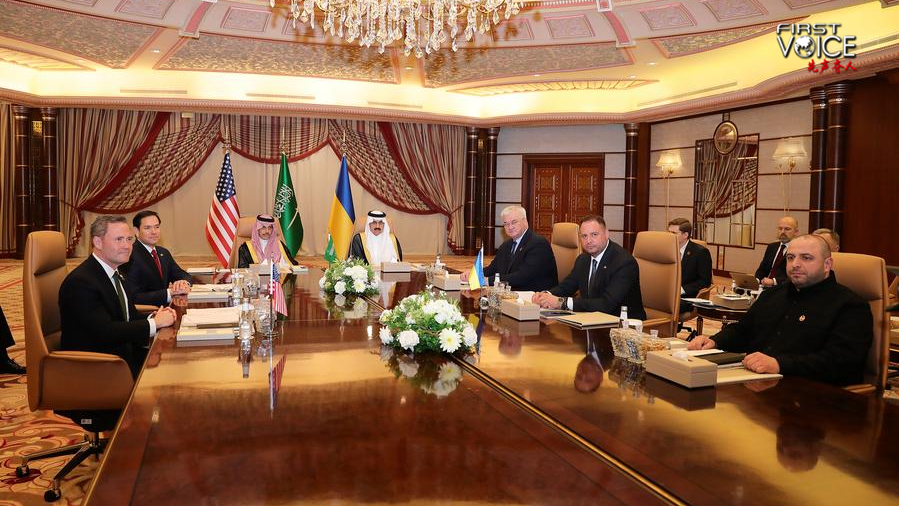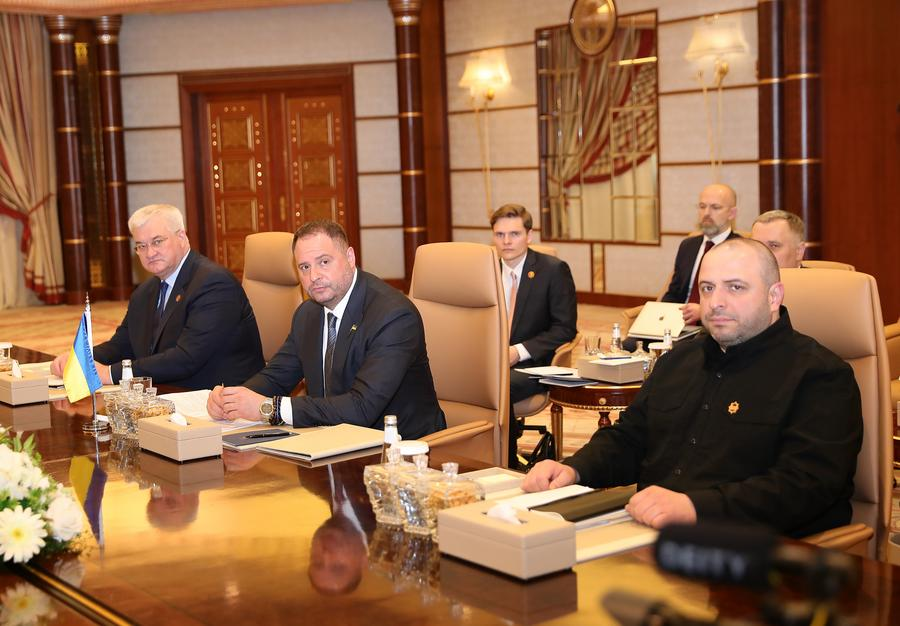
U.S. and Ukrainian delegations meet in Jeddah, Saudi Arabia, March 11, 2025. /Xinhua
First Voice
Days after bitter talks with his U.S. counterpart Donald Trump in the Oval Office, Ukrainian President Volodymyr Zelenskyy – with no other choice – has learned to play Trump's game.
"Ukraine expressed its readiness to accept the U.S. proposal to enact an immediate, interim 30-day ceasefire," according to the joint statement released Tuesday after Washington-Kyiv meetings in Saudi Arabia. In return, the U.S. will "immediately lift the pause on intelligence sharing and resume security assistance to Ukraine."
Since the conflict broke out three years ago, Zelenskyy has been repeatedly urging the United States for security guarantees. But in the meantime, Trump is straightforward about his purpose – to get the money back for the billions of dollars in aid to Ukraine. Washington's resumption of security assistance, unsurprisingly, is well-priced. In Tuesday's joint statement, the U.S. and Ukraine agreed to conclude a rare minerals deal "as soon as possible."
As the deal was halted after the Trump-Zelenskyy fiery exchanges last week, the Trump administration has resorted to a different approach as delegations of the two countries meet again in Saudi Arabia this week. Instead of coercing Ukraine to express gratitude to the U.S. with rare minerals like what happened in Oval Office, Trump's team has dangled the carrot this time in Saudi Arabia – the resumption of security assistance.

Head of the President's Office Andriy Yermak (C), Foreign Minister Andrii Sybiha (L) and Defense Minister Rustem Umerov (R) of the Ukrainian delegation are pictured during a high-stakes meeting in Jeddah, Saudi Arabia, March 11, 2025. /Xinhua
Be it the stick or the carrot, the Trump administration is firm in its ultimate purpose: to grab as much as possible from Ukraine. Under the guise of "peace" talks, the Trump administration aims to secure control over Ukraine's resources, thereby consolidating U.S. global dominance.
Rare minerals, which are required in aerospace, semiconductors, defense and many other key areas, are what the U.S. has been craving in recent years. Thus Trump has been straining every nerve, from coercion to security assistance, to work out a mineral deal with the Ukrainian government.
True, Washington, self-positioning as the "guardian" of world peace and freedom, has been providing military, intelligence, and financial assistance to Ukraine in the past three years. However, these maneuvers are believed to be an attempt to use Ukraine as a tool to strike Russia. Now, with Ukraine retreating one step after another with no sign of victory, Washington wants to get the money back and make the best use of its tool, which explains Trump's eagerness for a rare minerals deal.
It is also worth noting that U.S. Secretary of State Marco Rubio warned on Monday that Ukraine would have to cede "territory" to Russia as part of any peace agreement. If the Trump administration is sincere in its security guarantees to its allies, it will not push Ukraine to make concessions on land.
With a collapsing economy and rising death tolls, Ukraine has not much leverage at the table. Zelenskyy has no other choice but to dance to Trump's tune: pause the fighting, sign the mineral deal and accept the current frontlines being frozen on the map.
From a "firm ally" for Ukraine to a "neutral mediator" in peace talks, Washington has its selfish political calculations. It is not mediating for "peace" but to maximize its own interests in the conflict. Having reaped colossal profits from arms sales and energy sales to the EU, the U.S. is diverting its attention to mineral resources.
In the name of "peace," the U.S. has turned out to be the biggest winner in this conflict, and Ukraine is merely a pawn that can be discarded at any time.













